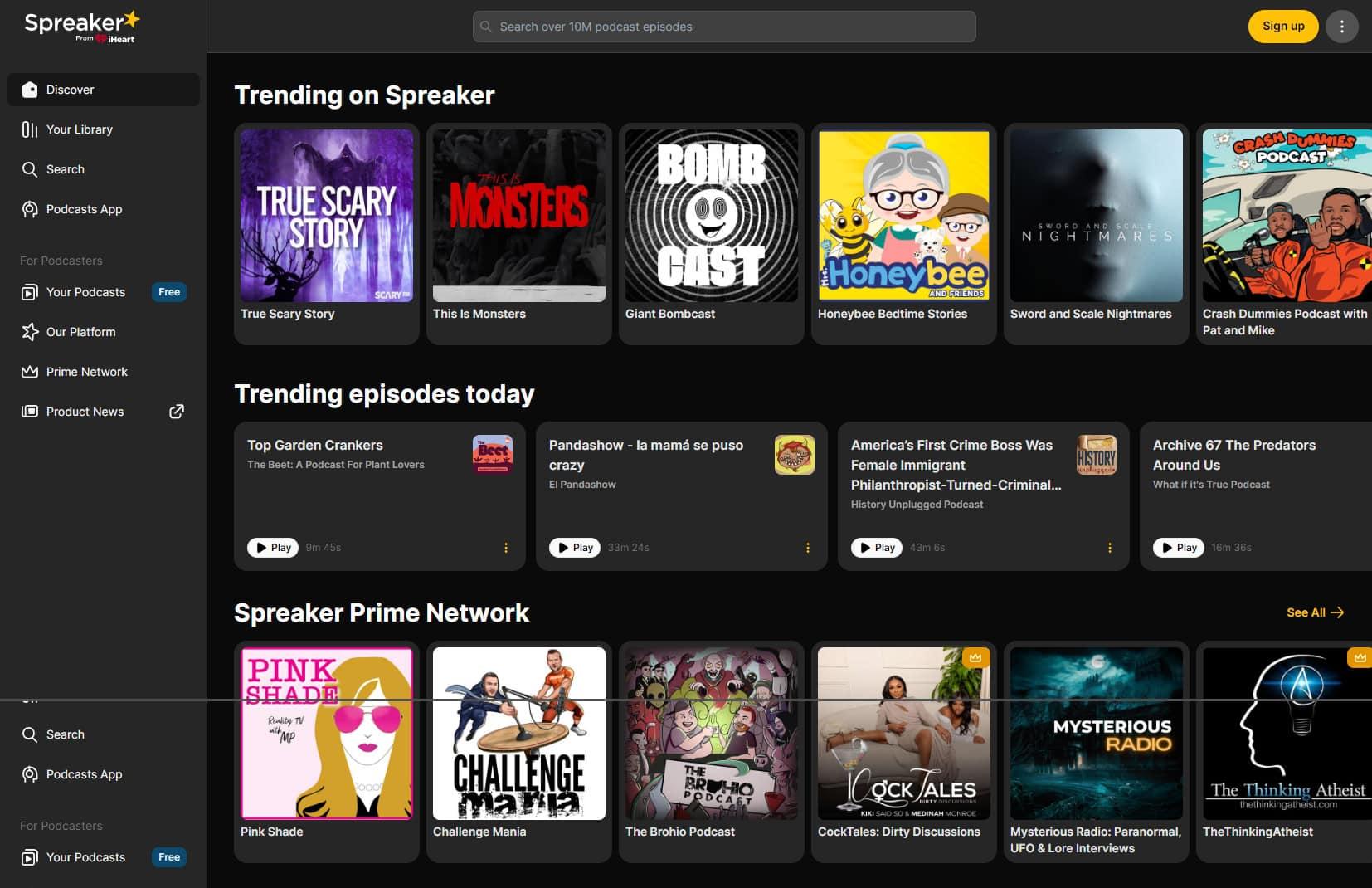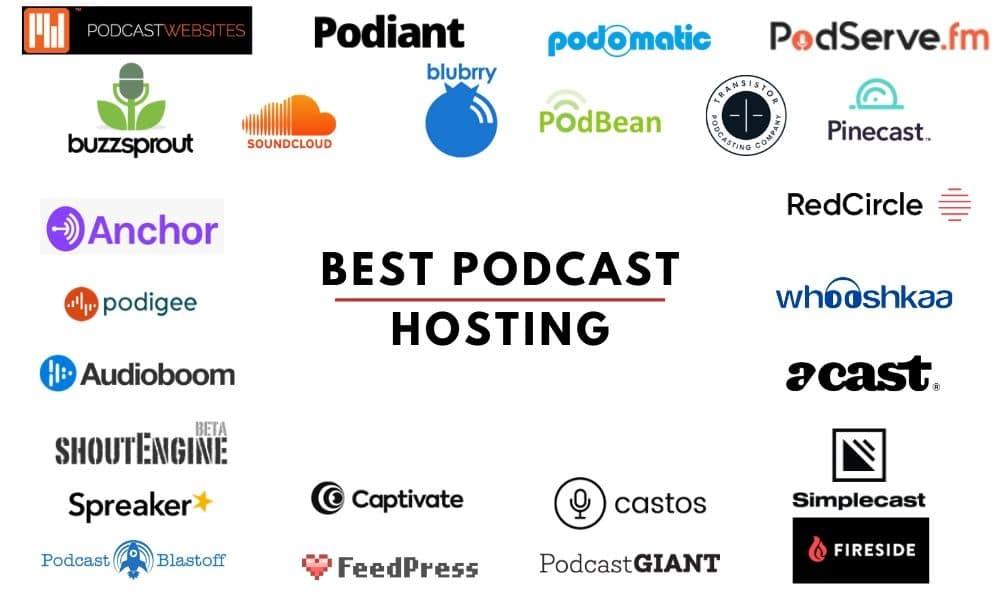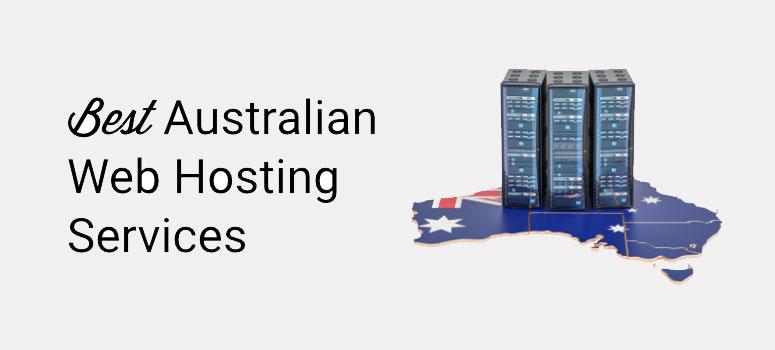Are you ready to dive into the exciting world of podcasting but worried about the costs? You’re not alone! With the podcasting landscape booming, many aspiring creators are on the lookout for the perfect platform to share their voices without breaking the bank. fortunately, 2025 brings a host of fantastic free podcast hosting solutions that cater to both beginners and seasoned pros alike. In this article, we’ll compare the 7 best free podcast hosting platforms, highlighting their features, ease of use, and unique perks. Whether you’re aiming to launch your first show or looking to switch to a more budget-friendly option, we’ve got you covered. Let’s explore how you can amplify your message and connect with listeners around the globe—all without spending a dime!
Exploring the Top Free Podcast Hosting Platforms for 2025
In 2025,the landscape of podcast hosting continues to evolve,offering creators a variety of free hosting platforms that cater to both beginners and seasoned podcasters. Several key features have become essential for anyone looking to share their voice with the world, including user-friendliness, storage capacity, and distribution options. Here’s a look at some of the standout platforms available this year.
Anchor remains one of the most popular choices for podcasters. Its seamless integration with Spotify allows for effortless distribution and monetization options. Users can record,edit,and manage their podcasts all within the app,making it a one-stop solution.Plus, Anchor offers unlimited storage, ensuring that your episodes are safe and accessible.
Podbean stands out with its robust analytics tools, helping you track your podcast’s performance in real-time. Its easy-to-navigate interface is designed for creators of all skill levels, providing features like customizable websites and promotional tools. The ability to host live podcasts adds a unique touch that can engage your audience in real-time.
Libsyn has long been a favorite in the podcasting community, and its free plan remains a viable option for new creators. While it may have some limitations in storage compared to others, Libsyn’s reliable service and excellent customer support make it a solid choice.Plus, their distribution network ensures that your podcast reaches major platforms, amplifying your audience reach.
| Feature | Anchor | Podbean | Libsyn |
|---|---|---|---|
| Storage | Unlimited | 5 hours/month | 50 MB/month |
| Analytics | Basic | Advanced | Basic |
| Monetization | Yes | Yes | No |
| Live Podcasting | No | Yes | No |
Another notable contender is buzzsprout, which offers a user-friendly experience along with attractive podcast websites. The platform provides a free plan with 2 hours of audio per month and a variety of promotional tools to help you grow your audience. Buzzsprout’s ease of use makes it an ideal choice for those new to podcasting.
Lastly, RedCircle has emerged as a powerful option for creators focused on growth. With its unique approach to cross-promotion and monetization, RedCircle encourages collaboration among podcasters. This not only helps in audience building but also creates a community feel, enriching the overall podcasting experience.
Understanding the Key Features That Matter Most to Podcasters
When it comes to choosing a podcast hosting solution, several key features can substantially impact your show’s success. Understanding these features is essential for podcasters looking to create and maintain a thriving audio presence. here are critical aspects to consider:
- Storage Space: Your chosen platform shoudl offer ample storage to accommodate your podcast episodes without limitations. Look for providers that allow unlimited or generous storage options to avoid running out of space.
- Bandwidth: High bandwidth capabilities are crucial for ensuring that your episodes are available for download and streaming without interruptions, especially during peak times.
- User-Friendly Interface: A straightforward and intuitive interface can save you time and frustration.you want to focus on creating content, not navigating complex software.
- Distribution Features: Automatic distribution to major podcast directories like Apple Podcasts, Spotify, and Google Podcasts will maximize your reach and visibility, so ensure your host supports this functionality.
- analytics: insightful analytics can provide valuable feedback on your audience’s listening habits, allowing you to tailor your content to better suit their preferences.
Additionally, monetization options can be a game-changer for many podcasters. Some hosting platforms offer built-in methods for ad placements or even listener support features, making it easier for you to generate revenue directly from your show. This can help you invest back into your podcast and elevate its quality.
Don’t overlook customer support either; having responsive support can be essential, especially when technical issues arise. Look for hosts that offer 24/7 support or comprehensive resources to help you troubleshoot common problems.
To help you visualize these features, here’s a comparison table of some of the best free podcast hosting solutions available in 2025:
| Hosting solution | Storage | Bandwidth | Analytics | Distribution |
|---|---|---|---|---|
| Podbean | Unlimited | High | Basic | Yes |
| Anchor | Unlimited | Unlimited | Advanced | Yes |
| Buzzsprout | 2 hours/month | High | Basic | Yes |
| Transistor | Unlimited | High | Advanced | Yes |
| Castos | Unlimited | High | Advanced | Yes |
By evaluating these features, you can make an informed decision that aligns with your podcasting goals. Each of these elements plays a vital role in both the day-to-day functioning of your podcast and its long-term growth potential.

How User-Friendly Interfaces Can Make or Break Your Podcast
In the competitive landscape of podcasting, having a user-friendly interface is no longer just a luxury—it’s a necessity. When you’re diving into the world of audio content creation, the last thing you want is to be bogged down by complicated navigation or overwhelming features. A streamlined interface can be the difference between a podcaster’s joy and their frustration.
Intuitive Design: When choosing a podcast hosting solution,look for platforms that prioritize intuitive design. Features such as easy episode uploads, seamless editing tools, and straightforward analytics can make your life significantly easier. With these tools at your fingertips,you can focus more on content creation rather than wrestling with the software.
Accessibility: Consider how accessible the interface is for both beginners and seasoned podcasters. A good podcast host will offer tutorials, FAQs, and customer support readily available, ensuring that no one feels lost on their journey.This accessibility not only helps in setting up your podcast but also encourages ongoing engagement as you grow your audience.
Mobile-Friendly Options: As more listeners tune in via mobile devices, your podcast hosting solution should also cater to this trend. A mobile-friendly interface ensures that you can upload episodes, check stats, and manage your podcast on the go. This flexibility can be a game-changer for busy creators who need to maximize every moment.
Comparison Table of User-Friendly Features:
| Podcast Host | User-Friendly Features | Mobile Access |
|---|---|---|
| Host A | Drag-and-drop uploads, simple episode editor | Yes |
| Host B | Step-by-step onboarding, 24/7 support | yes |
| Host C | Customizable templates, easy analytics | Limited |
Ultimately, the right podcast hosting solution will not only make your podcasting experience enjoyable but will also enhance your ability to reach and engage with your audience. Remember, a user-friendly interface can significantly reduce the learning curve, allowing you to concentrate on what truly matters: sharing your voice with the world.
Storage Limits and Bandwidth: What You Need to Know
When it comes to choosing a free podcast hosting solution, understanding the storage limits and bandwidth is crucial.These factors can significantly impact your podcast’s distribution and accessibility. Some platforms offer generous limits,while others may restrict your content’s potential reach. Here’s what you should keep in mind:
- Storage Limits: Free hosting services typically impose a cap on the amount of audio content you can upload. This means that if you plan to release episodes frequently, you need to choose a provider with a higher storage allowance.
- Bandwidth: This refers to the amount of data that can be transferred when listeners stream or download your episodes. High bandwidth ensures that your audience can access your content without interruptions, even during peak times.
- Episode Length: Some platforms may restrict the duration of each episode. If you produce longer content, ensure your chosen host can accommodate your needs.
To give you a clearer picture, here’s a comparison table highlighting the storage and bandwidth options of popular free podcast hosts:
| Podcast Host | Storage Limit | Bandwidth |
|---|---|---|
| Anchor | Unlimited | Unlimited |
| Podbean | 5 hours | 100GB/month |
| Buzzsprout | 2 hours/month | Unlimited |
| SoundCloud | 3 hours | Unlimited |
As you analyze your options, consider not just the numbers but also how they align with your podcasting goals.If you envision a rapidly growing audience, opting for a host with unlimited bandwidth and storage might be a wise investment in your podcast’s future. Ultimately, the right choice will support your creative vision while ensuring that your content reaches as many listeners as possible.

Monetization Options: Turning your Passion into Profit
As you embark on your podcasting journey, transforming your passion into a profitable venture is not just a dream—it’s entirely achievable. Leveraging your unique voice and outlook can attract a dedicated audience and open avenues for revenue. Here are some effective monetization strategies to consider:
- Sponsorships: Once you’ve built a loyal listener base, brands may pay to feature their products or services in your episodes. Crafting authentic partnerships can enhance your credibility and provide value to your audience.
- Listener Donations: platforms like patreon allow your audience to support you directly. Offering exclusive content or perks for subscribers can incentivize them to contribute financially.
- Affiliate Marketing: Recommend products or services relevant to your niche and earn a commission for every sale made through your referral link. This works particularly well if your content naturally incorporates these recommendations.
Another avenue worth exploring is merchandising. Create branded merchandise that resonates with your audience, whether it’s T-shirts, mugs, or stickers. This not only generates income but also strengthens community bonds as listeners show off their loyalty.
Consider offering premium content—such as bonus episodes or ad-free listening experiences—for a subscription fee. This model not only enhances your revenue stream but also provides added value to your most dedicated fans.
Lastly, don’t underestimate the power of live events. Hosting live shows, Q&A sessions, or workshops can create meaningful interactions with your audience, generating ticket sales and fostering a sense of community. the key is to keep your content engaging and authentic, making your listeners feel like they are part of something special.

Analytics and Insights: Tracking Your Podcasts Performance
Understanding how your podcast is performing is crucial to its success. By tracking key metrics, you can gain valuable insights into your audience’s preferences and behaviors. This allows you to make informed decisions about content, marketing strategies, and even guest appearances to enhance your listener engagement. Here are some essential metrics to keep an eye on:
- Download Numbers: Knowing how many downloads your episodes receive can give you a clear picture of your reach and popularity.
- Listener Retention: Track how long listeners stay engaged with your episodes. This metric can highlight which topics resonate most with your audience.
- Demographics: Understanding your audience’s age, gender, and location can help tailor your content and marketing efforts more effectively.
- Engagement Rates: Monitor social shares, comments, and reviews to gauge how well your content is connecting with listeners.
Many free podcast hosting solutions come equipped with analytical tools that can simplify the tracking process. These built-in features provide you with real-time data, allowing you to make adjustments swiftly. For instance, platforms like Podbean and Anchor not only offer hosting services but also deliver comprehensive analytics dashboards that break down your performance metrics into user-friendly visuals.
To make the most of your analytics, consider setting specific goals for your podcast. For example, you might aim to increase your download numbers by 20% over the next quarter or improve listener retention by 15%. By establishing clear objectives, you can focus your efforts and measure your progress over time. Here’s a simple table to illustrate how you might track these goals:
| Metric | Current Value | Goal for Next Quarter |
|---|---|---|
| Download Numbers | 1,000 | 1,200 |
| Listener Retention | 70% | 80% |
Lastly, don’t forget to leverage listener feedback when analyzing your podcast’s performance. Encourage your audience to leave reviews or fill out surveys. this qualitative data can complement your quantitative metrics, giving you a fuller picture of what your listeners value most. By combining these insights with data-driven decisions, you can create a podcast that not only engages but also grows your audience over time.

Integrations That Enhance Your podcasting Experience
When it comes to podcasting,the tools you use can significantly impact your overall experience and the quality of your content. Integrations with various platforms can streamline your workflow, enhance your reach, and even improve your listener engagement. Here’s a look at some essential integrations that can elevate your podcasting game.
- Social Media Scheduling Tools: connecting your podcast hosting solution with tools like Buffer or Hootsuite allows you to schedule posts across multiple social media platforms simultaneously. This ensures your episodes get the visibility they deserve without you needing to be online all the time.
- Email Marketing Services: Integrating with platforms like Mailchimp or ConvertKit enables you to build a dedicated listener base through newsletters. You can keep your audience updated on new episodes, share exclusive content, and even engage them with surveys or polls.
- Analytics Programs: Pairing your podcast host with analytics tools like Google Analytics or Podtrac allows you to track listener demographics and behavior. Understanding your audience is key to creating content that resonates with them.
- Audio Editing Software: Integrating with software like Audacity or Adobe Audition can definitely help you streamline the editing process. You can export directly from your editing software to your podcast host, saving you time and ensuring a seamless workflow.
Moreover, some podcast hosting platforms offer built-in integrations that can simplify the process even further.For instance, if you choose a host like Anchor or Buzzsprout, you’ll find direct integrations for monetization, transcription services, and even dynamic ad insertion options. These features not only enhance your podcast’s quality but also open up avenues for revenue generation.
| Integration Type | Benefits |
|---|---|
| Social Media Tools | Boost visibility & audience engagement |
| Email Marketing | Maintain listener relationships & drive traffic |
| Analytics | Understand audience & improve content |
| Audio Software | Streamlined editing & production |
don’t underestimate the power of community integrations. Joining platforms like Discord or Slack can connect you with fellow podcasters and listeners, fostering a supportive surroundings. Engaging with your audience in real-time enhances their loyalty and can provide valuable feedback for your content.

Community Support and Resources: Why They Matter
In the ever-evolving world of podcasting, having access to community support and resources can make all the difference for creators looking to establish themselves and grow their audience. Engaging with fellow podcasters, sharing insights, and tapping into collective knowledge can accelerate your journey, especially when you’re navigating the challenges of hosting and distribution.
Here are some compelling reasons why community support is invaluable:
- Shared Knowledge: Communities often host forums, webinars, and workshops where members can learn from one another. Whether it’s technical tips or content strategies, the shared expertise can help you avoid common pitfalls.
- Networking Opportunities: Connecting with other podcasters can lead to potential collaborations, guest spots, or even partnerships that can enhance your show’s reach and quality.
- Moral Support: Podcasting can be a solitary endeavor, and having a community provides encouragement and motivation.Celebrating milestones or getting feedback on new ideas can boost your confidence.
- Resource Sharing: Many communities curate lists of free and paid tools, hosting platforms, and promotional avenues that can definitely help you maximize your podcast’s potential without breaking the bank.
Additionally, many online platforms offer dedicated spaces for podcasters to discuss challenges and share solutions. For instance, social media groups, Reddit threads, and specialized forums can be treasure troves of information. in these settings, you can ask questions, seek advice, or simply engage in discussions about the latest trends in podcasting.
| Community Resource | Description |
|---|---|
| Facebook Groups | Active discussions, peer support, and promotional opportunities. |
| Subreddits dedicated to podcasting for sharing tips and experiences. | |
| Podcast Networks | Join networks for cross-promotion and audience growth. |
| meetup.com | Local gatherings for podcasters to connect and collaborate. |
Investing time in these communities not only enhances your podcasting skills but also fosters relationships that can lead to long-lasting support systems. As you embark on your podcasting journey, remember that you’re not alone—there’s a wealth of knowledge and camaraderie waiting to help you succeed.

Final Thoughts: choosing the Right Platform for Your Podcasting Journey
As you embark on your podcasting journey, selecting the right platform is crucial for your success. With a myriad of options available, it can be overwhelming to determine which hosting solution best aligns with your needs. Consider the following factors when making your choice:
- Ease of use: Opt for a platform that boasts an intuitive interface. You want to spend more time creating compelling content rather than navigating complex dashboards.
- storage and Bandwidth: Check the storage limits and bandwidth offered by each hosting service. Higher allowances are essential as your podcast grows, so pick a host that can scale with you.
- Distribution Features: Select a platform that simplifies syndication to various podcast directories. The easier it is to get your show into listeners’ ears, the better.
- Analytics: Understand your audience with robust analytics. Your chosen host should provide insights into listener demographics, downloads, and engagement metrics.
- support and Community: A responsive support team and an active community can be invaluable, especially for beginners. Look for platforms that offer tutorials, forums, and direct customer service.
| Platform | Storage | Analytics | Distribution |
|---|---|---|---|
| Platform A | Up to 10 hours | Basic | Yes |
| Platform B | Unlimited | Advanced | Yes |
| Platform C | 5 GB | Intermediate | Limited |
Ultimately, the perfect podcast hosting solution should meet your current demands while accommodating future growth. Take the time to explore trial versions, read user reviews, and even reach out to customer support to gauge their responsiveness. Remember, your podcast platform is the foundation of your content; investing in a reliable, feature-rich host can set you up for long-term success.
Don’t forget to weigh the trade-offs between free and premium features.While many free platforms offer impressive tools, they may come with limitations that could hinder your podcast’s evolution. Prioritize platforms that provide the flexibility and features you need to thrive in the competitive podcast landscape.
Frequently Asked Questions (FAQ)
Q&A: 7 Best Free Podcast Hosting Solutions compared for 2025
Q1: Why should I choose a free podcast hosting solution?
A: Great question! Free podcast hosting solutions are perfect for beginners or those testing the waters of podcasting. They allow you to launch your show without any financial commitment. Plus, many of these platforms offer essential features like analytics and distribution to major podcast directories. It’s a risk-free way to see if your podcasting dreams can turn into reality!
Q2: What key features should I look for in a podcast hosting platform?
A: Absolutely! When choosing a podcast host,look for features like storage limits,ease of use,analytics tools,distribution options,and community support.You want a platform that not only hosts your episodes but also helps you grow your audience and understand your listeners through analytics.
Q3: Are there any downsides to using free podcast hosting services?
A: Yes, there can be a few drawbacks. Free services may come with storage limits or fewer features compared to paid options. Some might include ads in your episodes or limit your bandwidth.Though, they’re still a fantastic starting point for many podcasters, especially if you’re just getting started.
Q4: Can you give me a fast overview of the best free podcast hosting solutions?
A: Sure! Here’s a sneak peek at our top 7 picks for 2025:
- Anchor - Known for its user-friendly interface and automatic distribution.
- Podbean – offers a robust free plan with decent analytics.
- Buzzsprout – Great for beginners with a simple setup process.
- Spreaker – Includes live podcasting capabilities.
- redcircle - Focuses on monetization options even for free users.
- Transistor – Offers a unique free trial and excellent support.
- SoundCloud - Great integration with music but has storage limits.
Q5: how can I monetize my podcast if I start with a free hosting service?
A: Many free hosting services have built-in monetization options or support sponsorships, even for free plans. For instance, RedCircle allows you to connect with advertisers easily. Plus,as you grow your audience,you can explore crowdfunding options or offer premium content to your listeners.
Q6: Is it easy to switch from a free hosting service to a paid one later?
A: Yes, most platforms make it easy to migrate your podcast to a paid service if you decide to upgrade later. You’ll generally just need to follow a few steps to ensure your episodes and audience stay intact. It’s definitely a seamless transition for those who find success with their podcast!
Q7: What should I do after selecting a hosting platform?
A: Once you’ve chosen your hosting platform, it’s time to get creative! Start by planning your content, recording your episodes, and designing your podcast cover art. Don’t forget to promote your show on social media and engage with your audience. The more you connect with your listeners, the more they’ll tune in!
Q8: Any final tips for aspiring podcasters?
A: Absolutely! Stay consistent and be patient. Building an audience takes time. Focus on creating quality content and staying true to your niche. Engage with your listeners and continuously seek feedback.Remember, podcasting is a journey—enjoy every moment of it!
This Q&A format should help readers understand the benefits and considerations of using free podcast hosting solutions in a friendly and persuasive manner!
The Conclusion
As we wrap up our deep dive into the 7 Best Free podcast Hosting Solutions for 2025, it’s clear that the right platform can make all the difference in your podcasting journey. Whether you’re a seasoned pro or just starting out, these hosting options not only help you reach your audience but also provide tools to grow and enhance your podcasting experience.
Remember, it’s not just about finding a free service; it’s about choosing one that aligns with your goals and provides the support you need. Each of the platforms we’ve covered has its unique strengths, so take a moment to reflect on what features matter most to you. Do you need advanced analytics? An easy-to-use interface? Maybe seamless integrations with other tools? Whatever your priorities are, there’s a perfect match waiting for you.
So, don’t hesitate! Dive into the world of podcasting and let your voice be heard. With the right hosting solution, you’ll be on your way to creating, sharing, and connecting with listeners who are eager for your content. Happy podcasting,and remember—your story deserves to be told!



